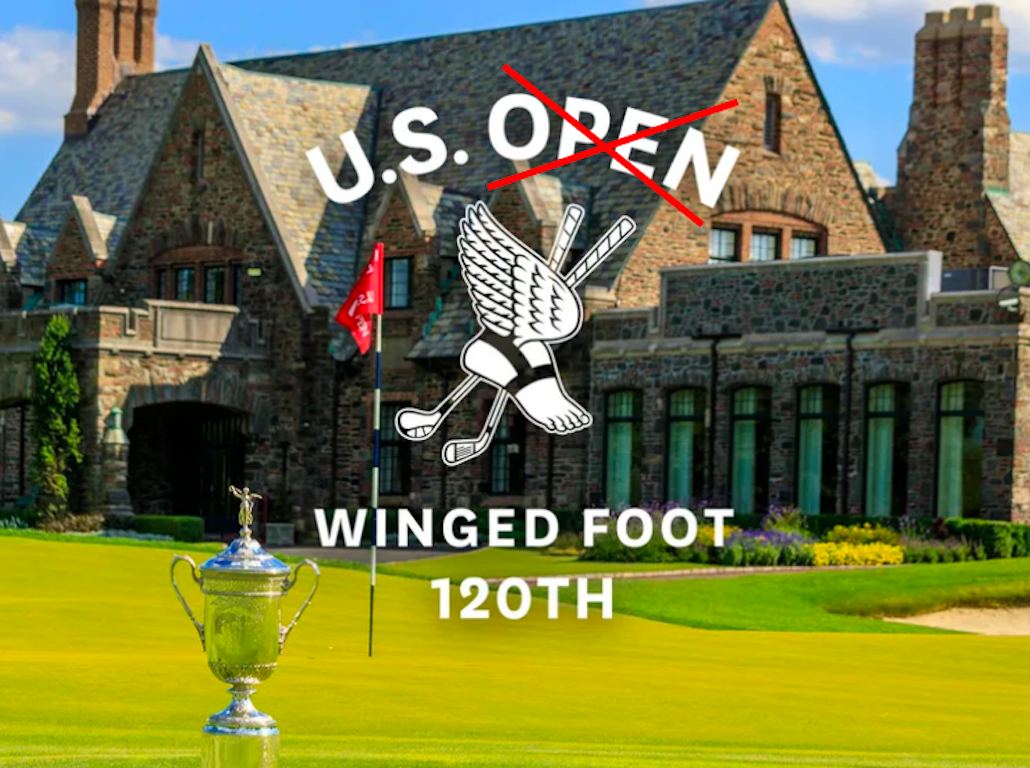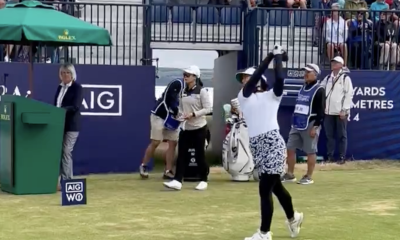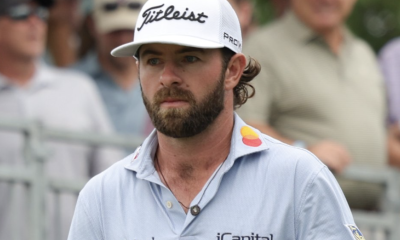Opinion & Analysis
By definition, there will be no 2020 U.S. Open. Here’s why the USGA should reconsider

In 1942, the USGA decided to cancel the U.S. Open because it was scheduled so soon after U.S. entry into WWII. They did this out of respect for the nation and those called to war. There was a Championship however called The Hale America National Open Golf Tournament, which was contested at Chicago’s Ridgemoor Country Club. It was a great distraction from the horror of war and raised money for the great cause.
All the top players of the era (except Sam Snead) played, and the organizers (USGA, Chicago Golf Association, and the PGA of America) did hold qualifying at some 70 sites around the country. So effectively, it was the 1942 U.S. Open—but the USGA never recognized it as such. They labeled it a “wartime effort to raise money” for the cause. Their objection to it being the official U.S. Open was never clear, although the sub-standard Ridgemoor course (a veritable birdie fest) was certainly part of it.
The USGA co-sponsored the event but did not host it at one of their premier venues, where they typically set the golf course up unusually difficult to test the best players. Anyway, Ben Hogan won the event and many thought this should have counted as his fifth U.S. Open win. The USGA disagreed. That debate may never be settled in golfer’s minds.
Ahead to the 1964 U.S. Open…Ken Venturi, the eventual winner, qualified to play in the tournament. His game at the time was a shell of what it was just a few years earlier, but Kenny caught lighting in a bottle, got through both stages of qualifying, and realized his lifelong dream of winning the U.S. Open at Congressional.
Ahead to the 1969 U.S. Open…Orville Moody, a former army sergeant had been playing the PGA Tour for two years with moderate success-at best. But the golfing gods shone brightly upon “sarge” through both stages of qualifying, and the tournament, as he too realized the dream of a lifetime in Houston.
Ahead to 2009 U.S. Open…Lucas Glover was the 71st ranked player in the world and had never made the cut in his three previous U.S. Opens. But he did get through the final stage of qualifying and went on to win the title at Bethpage in New York.
Ahead to 2020…The USGA has decided to postpone the event this year to September because of the Covid-19 virus. This was for the fear of the global pandemic. But this year there is a fundamental difference—the USGA has announced there will be no qualifying for the event. It will be an exempt-only event. By doing so, the event loses it status as an “open event,” by definition.
This is more than a slight difference in semantics.
The U.S. Open, our national championship, is the crown jewel of all USGA events for many reasons, not the least of which is that it is just that: open. Granted, the likelihood of a club professional or a highly-ranked amateur winning the event—or even making the cut—is slim, but that misses the point: they have been stripped of their chance to do so, and have thereby lost a perhaps once in a lifetime opportunity to realize something they have worked for their whole lives. Although I respect the decision from a health perspective, golf is being played now across the country, (The Match and Driving Relief—apparently safely)
So, what to do? I believe it would be possible to have one-day 36-hole qualifiers (complete with social distancing regulations) all over the country to open the field. Perhaps, the current health crisis limits the opportunity to hold the qualifiers at the normally premier qualifying sites around the country but, as always, everyone is playing the same course and is at least given the chance to play in tournament.
In light of the recent “opening” of the country, I am asking that the USGA reconsider the decision.
featured image modified from USGA image
Opinion & Analysis
The 2 primary challenges golf equipment companies face

As the editor-in-chief of this website and an observer of the GolfWRX forums and other online golf equipment discourse for over a decade, I’m pretty well attuned to the grunts and grumbles of a significant portion of the golf equipment purchasing spectrum. And before you accuse me of lording above all in some digital ivory tower, I’d like to offer that I worked at golf courses (public and private) for years prior to picking up my pen, so I’m well-versed in the non-degenerate golf equipment consumers out there. I touched (green)grass (retail)!
Complaints about the ills of and related to the OEMs usually follow some version of: Product cycles are too short for real innovation, tour equipment isn’t the same as retail (which is largely not true, by the way), too much is invested in marketing and not enough in R&D, top staffer X hasn’t even put the new driver in play, so it’s obviously not superior to the previous generation, prices are too high, and on and on.
Without digging into the merits of any of these claims, which I believe are mostly red herrings, I’d like to bring into view of our rangefinder what I believe to be the two primary difficulties golf equipment companies face.
One: As Terry Koehler, back when he was the CEO of Ben Hogan, told me at the time of the Ft Worth irons launch, if you can’t regularly hit the golf ball in a coin-sized area in the middle of the face, there’s not a ton that iron technology can do for you. Now, this is less true now with respect to irons than when he said it, and is less and less true by degrees as the clubs get larger (utilities, fairways, hybrids, drivers), but there remains a great deal of golf equipment truth in that statement. Think about it — which is to say, in TL;DR fashion, get lessons from a qualified instructor who will teach you about the fundamentals of repeatable impact and how the golf swing works, not just offer band-aid fixes. If you can’t repeatably deliver the golf club to the golf ball in something resembling the manner it was designed for, how can you expect to be getting the most out of the club — put another way, the maximum value from your investment?
Similarly, game improvement equipment can only improve your game if you game it. In other words, get fit for the clubs you ought to be playing rather than filling the bag with the ones you wish you could hit or used to be able to hit. Of course, don’t do this if you don’t care about performance and just want to hit a forged blade while playing off an 18 handicap. That’s absolutely fine. There were plenty of members in clubs back in the day playing Hogan Apex or Mizuno MP-32 irons who had no business doing so from a ballstriking standpoint, but they enjoyed their look, feel, and complementary qualities to their Gatsby hats and cashmere sweaters. Do what brings you a measure of joy in this maddening game.
Now, the second issue. This is not a plea for non-conforming equipment; rather, it is a statement of fact. USGA/R&A limits on every facet of golf equipment are detrimental to golf equipment manufacturers. Sure, you know this, but do you think about it as it applies to almost every element of equipment? A 500cc driver would be inherently more forgiving than a 460cc, as one with a COR measurement in excess of 0.83. 50-inch shafts. Box grooves. And on and on.
Would fewer regulations be objectively bad for the game? Would this erode its soul? Fortunately, that’s beside the point of this exercise, which is merely to point out the facts. The fact, in this case, is that equipment restrictions and regulations are the slaughterbench of an abundance of innovation in the golf equipment space. Is this for the best? Well, now I’ve asked the question twice and might as well give a partial response, I guess my answer to that would be, “It depends on what type of golf you’re playing and who you’re playing it with.”
For my part, I don’t mind embarrassing myself with vintage blades and persimmons chasing after the quasi-spiritual elevation of a well-struck shot, but that’s just me. Plenty of folks don’t give a damn if their grooves are conforming. Plenty of folks think the folks in Liberty Corner ought to add a prison to the museum for such offences. And those are just a few of the considerations for the amateur game — which doesn’t get inside the gallery ropes of the pro game…
Different strokes in the game of golf, in my humble opinion.
Anyway, I believe equipment company engineers are genuinely trying to build better equipment year over year. The marketing departments are trying to find ways to make this equipment appeal to the broadest segment of the golf market possible. All of this against (1) the backdrop of — at least for now — firm product cycles. And golfers who, with their ~15 average handicap (men), for the most part, are not striping the golf ball like Tiger in his prime and seem to have less and less time year over year to practice and improve. (2) Regulations that massively restrict what they’re able to do…
That’s the landscape as I see it and the real headwinds for golf equipment companies. No doubt, there’s more I haven’t considered, but I think the previous is a better — and better faith — point of departure when formulating any serious commentary on the golf equipment world than some of the more cynical and conspiratorial takes I hear.
Agree? Disagree? Think I’m worthy of an Adam Hadwin-esque security guard tackle? Let me know in the comments.
@golfoncbs The infamous Adam Hadwin tackle ? #golf #fyp #canada #pgatour #adamhadwin ? Ghibli-style nostalgic waltz – MaSssuguMusic
Podcasts
Fore Love of Golf: Introducing a new club concept

Episode #16 brings us Cliff McKinney. Cliff is the founder of Old Charlie Golf Club, a new club, and concept, to be built in the Florida panhandle. The model is quite interesting and aims to make great, private golf more affordable. We hope you enjoy the show!
Opinion & Analysis
On Scottie Scheffler wondering ‘What’s the point of winning?’

Last week, I came across a reel from BBC Sport on Instagram featuring Scottie Scheffler speaking to the media ahead of The Open at Royal Portrush. In it, he shared that he often wonders what the point is of wanting to win tournaments so badly — especially when he knows, deep down, that it doesn’t lead to a truly fulfilling life.
View this post on Instagram
“Is it great to be able to win tournaments and to accomplish the things I have in the game of golf? Yeah, it brings tears to my eyes just to think about it because I’ve literally worked my entire life to be good at this sport,” Scheffler said. “To have that kind of sense of accomplishment, I think, is a pretty cool feeling. To get to live out your dreams is very special, but at the end of the day, I’m not out here to inspire the next generation of golfers. I’m not out here to inspire someone to be the best player in the world, because what’s the point?”
Ironically — or perhaps perfectly — he went on to win the claret jug.
That question — what’s the point of winning? — cuts straight to the heart of the human journey.
As someone who’s spent over two decades in the trenches of professional golf, and in deep study of the mental, emotional, and spiritual dimensions of the game, I see Scottie’s inner conflict as a sign of soul evolution in motion.
I came to golf late. I wasn’t a junior standout or college All-American. At 27, I left a steady corporate job to see if I could be on the PGA Tour starting as a 14-handicap, average-length hitter. Over the years, my journey has been defined less by trophies and more by the relentless effort to navigate the deeply inequitable and gated system of professional golf — an effort that ultimately turned inward and helped me evolve as both a golfer and a person.
One perspective that helped me make sense of this inner dissonance around competition and our culture’s tendency to overvalue winning is the idea of soul evolution.
The University of Virginia’s Division of Perceptual Studies has done extensive research on reincarnation, and Netflix’s Surviving Death (Episode 6) explores the topic, too. Whether you take it literally or metaphorically, the idea that we’re on a long arc of growth — from beginner to sage elder — offers a profound perspective.
If you accept the premise literally, then terms like “young soul” and “old soul” start to hold meaning. However, even if we set the word “soul” aside, it’s easy to see that different levels of life experience produce different worldviews.
Newer souls — or people in earlier stages of their development — may be curious and kind but still lack discernment or depth. There is a naivety, and they don’t yet question as deeply, tending to see things in black and white, partly because certainty feels safer than confronting the unknown.
As we gain more experience, we begin to experiment. We test limits. We chase extreme external goals — sometimes at the expense of health, relationships, or inner peace — still operating from hunger, ambition, and the fragility of the ego.
It’s a necessary stage, but often a turbulent and unfulfilling one.
David Duval fell off the map after reaching World No. 1. Bubba Watson had his own “Is this it?” moment with his caddie, Ted Scott, after winning the Masters.
In Aaron Rodgers: Enigma, reflecting on his 2011 Super Bowl win, Rodgers said:
“Now I’ve accomplished the only thing that I really, really wanted to do in my life. Now what? I was like, ‘Did I aim at the wrong thing? Did I spend too much time thinking about stuff that ultimately doesn’t give you true happiness?’”
Jim Carrey once said, “I think everybody should get rich and famous and do everything they ever dreamed of so they can see that it’s not the answer.”
Eventually, though, something shifts.
We begin to see in shades of gray. Winning, dominating, accumulating—these pursuits lose their shine. The rewards feel more fleeting. Living in a constant state of fight-or-flight makes us feel alive, yes, but not happy and joyful.
Compassion begins to replace ambition. Love, presence, and gratitude become more fulfilling than status, profits, or trophies. We crave balance over burnout. Collaboration over competition. Meaning over metrics.
Interestingly, if we zoom out, we can apply this same model to nations and cultures. Countries, like people, have a collective “soul stage” made up of the individuals within them.
Take the United States, for example. I’d place it as a mid-level soul: highly competitive and deeply driven, but still learning emotional maturity. Still uncomfortable with nuance. Still believing that more is always better. Despite its global wins, the U.S. currently ranks just 23rd in happiness (as of 2025). You might liken it to a gifted teenager—bold, eager, and ambitious, but angsty and still figuring out how to live well and in balance. As much as a parent wants to protect their child, sometimes the child has to make their own mistakes to truly grow.
So when Scottie Scheffler wonders what the point of winning is, I don’t see someone losing strength.
I see someone evolving.
He’s beginning to look beyond the leaderboard. Beyond metrics of success that carry a lower vibration. And yet, in a poetic twist, Scheffler did go on to win The Open. But that only reinforces the point: even at the pinnacle, the question remains. And if more of us in the golf and sports world — and in U.S. culture at large — started asking similar questions, we might discover that the more meaningful trophy isn’t about accumulating or beating others at all costs.
It’s about awakening and evolving to something more than winning could ever promise.




















chip75
Jun 1, 2020 at 8:24 am
Unless the Open is open it’s an invitational and should be labelled as such.
Mike
May 30, 2020 at 12:16 pm
But, we are talking about the ‘USGA’ right? That org lost credibility w/ me years ago, so I’m not surprised at anything they’d do.
YB
May 29, 2020 at 2:02 pm
Dennis you are 100% correct. If they can host a major tournament, they can have local and regional qualifiers. Local is 100% people driving to their courses – regional, some people fly but not the majority.
The fact is if people aren’t allowed to qualify, it’s not an OPEN tournament and it’s just another members’ club invitational . Needs to change now!
Pelling
May 29, 2020 at 11:59 am
Give Andy Pope an exemption!
davidar4iron
May 29, 2020 at 7:20 am
Possibly change the name to the USGA championship for a one off – still use the trophy, its still a major, but its an acknowledegment of the times –
Interntaional qualifying is central to both open champioships so just because you can get in your car and drive to AZ or wherever, international travel will still be hugely problematic.
COVID19 is not a hoax – maybe poeple feel isolated and frustrated in their bubble but 37000 people have died here in the UK ‘officially’ never mind the 30,000 ‘additional deaths’ over average. Yes its reducing but only thanks to social distancing.
YB
May 29, 2020 at 2:00 pm
100% correct. It is not an OPEN this year
Gusty
May 29, 2020 at 6:44 am
Good thing there was qualifying in 1913 when Francis Ouimet qualified as an amateur and then won US Open….changing the game forever!
Moses
May 28, 2020 at 11:55 pm
As far as I’m concerned Hogan has 5 US Opens.
Brian Moore
May 29, 2020 at 10:55 am
Sound Comment! Nicely done
Brian Moore
May 29, 2020 at 10:56 am
Absolutely!
Dennis Clark
May 29, 2020 at 12:43 pm
I tend to agree with that but the boys at Far Hills…
Alrx
May 28, 2020 at 11:00 pm
By definition Stfu. The show must go on!
VictrC
May 28, 2020 at 3:15 pm
With all due respect, the country, the people, the American people NEED the US Open. They need this despite there being no qualifying. I am bummed, along with the other 1,000’s that were going to try knowing they had little to no chance. But the good of the nation is more important right now than being pedantic about the word “Open.”. It is our national championship and the public wants to see if Tiger can win. If Phil can make one more charge against Father Time. Is this Speith’s redemption.
The people have had to deal with a crippling shutdown. Kids are going hungry, 40M people have lost their jobs. Businesses that were open for generations will never open again because of the shutdown. It could take years before we are back to Normal. I think we could at least give this nation a distraction, a refuge from the reality of the world that is upside down right now. We’ve taken away, the American people have lost so much, why take this away too just because of the word “open.” Is that where we are now? We’re so pure that if it can’t be “open” to all qualifiers, NONE OF WHOM WILL WIN, then no one gets to play?
Dennis Clark
May 29, 2020 at 12:50 pm
I see your point but a “the country” may be too broad of a description. 90% of this country does not play or care much about golf. 3 million watched the Open last year, 100 million the super bowl. So whether we hold the Open or not, is not necessarily a national spirit-lifter. For us in the golf community, absolutely. On average if you meet 10 people in the street, 9 of them don’t play golf. We are Jonesin…som I can’t wait. With a qualifier hopefully…
Dennis Clark
May 28, 2020 at 2:31 pm
I am not discounting or minimizing the gravity of this pandemic. This was not my intention. And the fact that non exempt qualifiers have little to no chance had already been mentioned in the article. What I AM saying is if it is safe to play the event itself why is it unsafe to have qualifiers? And if it is unsafe, either cancel the event or rename it. Golf pales in comparison To this surreal crisis, but’s let’s not have one and not the other. Personally I think the Open should be canceled if there is no change in the crisis but the powers that be are unlikely to consider that option. So..
J Mc
May 28, 2020 at 1:37 pm
Steve Jones was last winner to go through both stages of Q school. Plus there’s a lot more on the line for qualifiers than just winning the event. You can gain exemptions into other tournaments based on your finish, you can gain exemptions into other majors, gain an exemption into next year’s U.S. Open based on your finish, and you can also skip certain stages of qualifying school based on your finish. I’m not saying I agree that they should open qualifiers back up but at least don’t advertise it as a US open if it’s not open
Joe Taylor
May 28, 2020 at 12:39 pm
Difference right now is the danger of traveling, the three winners cited were not at risk by entering the event. AOC, 100k dead is a hoax?
J Mc
May 28, 2020 at 1:34 pm
Doesn’t change the fact that it’s not an “Open”. I think the point of the article is either halve qualifying call it an “open” or don’t have qualifying and don’t call it an open just call it a USGA championship. Can’t call it an open when it’s not open, Can’t have it both ways
Dennis Clark
May 28, 2020 at 2:22 pm
Local qualifying is a drive in ones car. No flight.
A. Commoner
May 29, 2020 at 10:39 am
Not always true!
BG
May 28, 2020 at 11:39 am
I dont see why they cant do qualifiers. Here in Arizona courses last week were doing 200-400 rounds a day. Not to mention a albeit slower season than normal but still busy season of golf in Arizona. Golf hasnt slowed down much here and everything is ok.
BAV
May 28, 2020 at 5:48 pm
I’m hoping you’re just referring to the golf community being okay, and not in general terms in AZ??
People can still play golf here but there are a lot of people who rely on the golf industry for their livelihoods that were laid off or let go with no return to normalcy in sight. I would imagine they wouldn’t agree with your “everything is ok” comment
Mike
May 28, 2020 at 11:32 am
This is a once in a century virus. These are very unusual times and Dennis should just get off his high horse and relax. The odds are 99.8% that whoever wins in an exempt event would be the same winner if it was a true open event. Everyone has to make concessions this year and every aspect of life. Whether or not the U.S. Open is a true “Open” Should be very very low on the list of priorities.
AOC
May 28, 2020 at 11:23 am
if they can play the us open , they can play the qualifiers. covid is the biggest hoax the world has seen
Emily Kayton
May 28, 2020 at 1:57 pm
My 57 healthy aunt died a painful from covid. You ignorant a hole.
Rory
May 28, 2020 at 2:29 pm
And my cousin died in a car crash, but I don’t see people wanting to make speed limits 5MPH despite the lives that would save. Worldwide COVID is responsible for about 1.5% of the deaths YTD. NOt sure that justifies the reaction it has received….
Pancho Villas cousin
May 28, 2020 at 11:43 pm
Preach Rory, PREACH!!! Kinda convenient this has become a giant political vomit fest right before an election?? (Thats about as far as this needs to go into politics too…)
Dennis Clark
May 28, 2020 at 2:59 pm
Very sorry for your loss, my deepest sympathies.